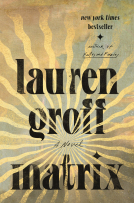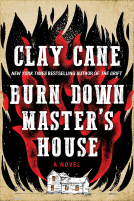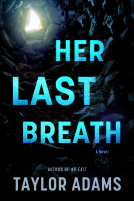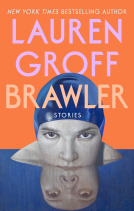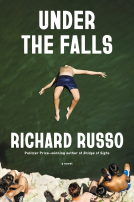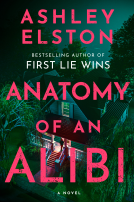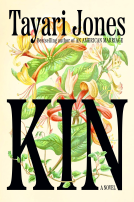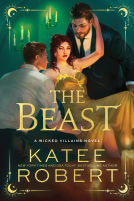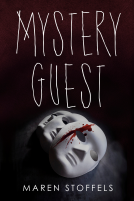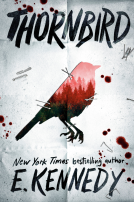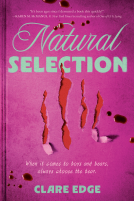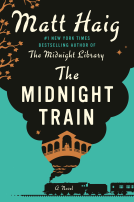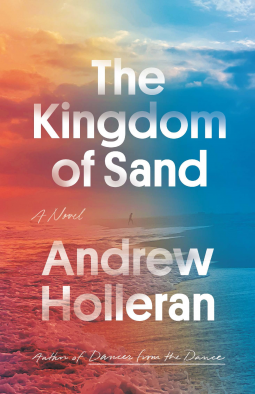
The Kingdom of Sand
A Novel
by Andrew Holleran
This title was previously available on NetGalley and is now archived.
Send NetGalley books directly to your Kindle or Kindle app
1
To read on a Kindle or Kindle app, please add kindle@netgalley.com as an approved email address to receive files in your Amazon account. Click here for step-by-step instructions.
2
Also find your Kindle email address within your Amazon account, and enter it here.
Pub Date Jun 07 2022 | Archive Date Oct 20 2022
Description
A NEW YORK TIMES BOOK REVIEW EDITOR'S CHOICE PICK
ONE OF THE LONDON TIMES' TOP TWENTY-SIX FICTION BOOKS OF THE YEAR
LA TIMES 5 BEST BOOKS OF 2022
BBC CULTURE'S 50 BEST BOOKS OF 2022
LONGLIST FOR THE MARK TWAIN AMERICAN VOICE IN LITERATURE AWARD
"[Holleran's] new novel is all the more affecting and engaging because the images of isolation and old age here are haunted . . . in 1978 Holleran wrote the quintessential novel about gay abandon, the sheer, careless pleasure of it: Dancer From the Dance. Now, at almost 80 years of age, he has produced a novel remarkable for its integrity, for its readiness to embrace difficult truths and for its complex way of paying homage to the passing of time." —Colm Toibin, The New York Times Book Review
"It’s rare to find fiction that takes this kind of dying of the light as its subject and doesn’t make its heroes feel either pathetic or polished with a gleam of false dignity . . . This sad, beautiful book captures the sensations Holleran’s characters are chasing — as well as the darkness that inevitably comes for them, and us." —Mark Athitakis, The Los Angeles Times
One of the great appeals of Florida has always been the sense that the minute you get here you have permission to collapse.
The Kingdom of Sand is a poignant tale of desire and dread—Andrew Holleran’s first new book in sixteen years. The nameless narrator is a gay man who moved to Florida to look after his aging parents—during the height of the AIDS epidemic—and has found himself unable to leave after their deaths. With gallows humor, he chronicles the indignities of growing old in a small town.
At the heart of the novel is the story of his friendship with Earl, whom he met cruising at the local boat ramp. For the last twenty years, he has been visiting Earl to watch classic films together and critique the neighbors. Earl is the only person in town with whom he can truly be himself. Now Earl’s health is failing, and our increasingly misanthropic narrator must contend with the fact that once Earl dies, he will be completely alone. He distracts himself with sexual encounters at the video porn store and visits to Walgreens. All the while, he shares reflections on illness and death that are at once funny and heartbreaking.
Holleran’s first novel, Dancer from the Dance, is widely regarded as a classic work of gay literature. Reviewers have described his subsequent books as beautiful, exhilarating, seductive, haunting, and bold. The Kingdom of Sand displays all of Holleran’s considerable gifts; it’s an elegy to sex and a stunningly honest exploration of loneliness and the endless need for human connection, especially as we count down our days.
Available Editions
| EDITION | Other Format |
| ISBN | 9780374600969 |
| PRICE | $27.00 (USD) |
| PAGES | 272 |
Average rating from 52 members
Featured Reviews
It's the writing that kept me wanting for more from the story as well as from the characters.
I wonder how the best authors do it but it's rare for me to find the exact emotions in the writing that reflects the plot of the story perfectly. This is one of those books.
It's heartbreaking. It's really sad and quiet like I was drowning in my own solitude while I was reading it.
The characters feel so real. It feels like I was reading a personal diary of someone who's baring their soul to someone they trust.
This book has the capacity to make you feel alone the whole time; make you go so aware of your own feelings that it's just impossible not to think about the unnecessary things we give so much importance to while we choose to neglect the small things that would matter ultimately.
It's one of those books which make you reflect on your life, the people you care about and the times when these people would no longer be around you.
I cannot wait for the book to come out.
Thank you, Farrar Straus and Giroux and the author, for the advance reading copy.
 William G, Reviewer
William G, Reviewer
I was very torn by this story. I found it interesting, that we never learn the narrator's name. I have thought quite a bit on this creative choice and I would love to know why the author chose this.
This story is universal, regardless of how anyone identifies. We all get older. Things change. Time goes by quicker than we imagine. Sometimes, dreams remain just that, dreams. Things we hoped for ourselves don't turn out that way. And death...we are all touched by death and eventually, we all meet death.
This story spoke to me on a very personal level. And as a gay man, I think it really speaks to what society projects on us and how we deal with that.
I found the story hard at times to read, not because the narrative was bad. Because it wasn't. It was rather excellent. It was tough to read because it's so incredibly honest and it's scary subject matter.
I had my reservations at first when I began but I quickly changed my opinion. I think it's a beautiful story and it's one we all are faced with sooner or later. I think we need more stories like this.
⭐ ⭐ ⭐ ⭐ ⭐
Disclosure: I received a free ARC copy of this book through Naturally in exchange for my honest review.
In 1978 Andrew Holleran published Dancer From The Dance which is widely considered one of the most important books of American Queer literature. Now after a 13-year absence, he is back with his novel The Kingdom of Sand. I have yet to read his novels Nights in Aruba, The Beauty of Men, and Grief, but from reading their synopses I think it is safe to say there is at least some interconnectedness between the books and Kingdom of Sand. Since I have not read the other books I will be reviewing this book as a stand-alone novel. The Kingdom of Sand is a slow book that moves like the older characters who inhabit it. Holleran who is now in his late 70s has written a book that examines the anxieties of growing old as a gay man of a certain generation and facing one's mortality. The Kingdom of Sand is a beautiful and achingly lonely text that explores the indignities of daring to grow old in a community that covets youth. The invisibility that older gay men feel and the isolation of aging in the conservative south. With rich descriptions, Holleran brings us to the outskirts of Gainesville Florida where our nameless narrator is facing what are supposed to be his golden years. Living in the house of his long-deceased parents he finds himself watching time slip from his fingers as he rushes towards the future in a house haunted by the past. His few joys in life are his long walks through town and his cherished relationship with his friend Earl. Earl, a retired professor 20 years the narrator's senior, offers a glimpse of what is to become of his own twilight years. Through his friendship with Earl, the narrator laments the humiliation that is growing old and ponders his own inevitable demise. The Kindom of Sand offers a view into a world rarely explored in LGBTQIA+ literature. Death within LGBTQIA+ literature is nothing new but it is so often only written about in tragic terms at the hands of violence or AIDS. This book broke my heart in so many ways as it offers no catharsis only the sad truth that so many of our elders face their end days alone .
 Bookseller 754714
Bookseller 754714
Kingdom of Sand follows our unnamed narrator as he grapples with old-age. Drawing on age, queerness, loneliness, and grief - we are given a front row seat to one mans unraveling in Florida. The novel is unhurried, and gives the reader plenty of time to ruminate on the crippling monotony of being alive while simultaneously waiting to die.
Wonderful prose from a fantastic writer. This elegiac book left me full of sorrow, but also so satisfied. I love the narrative voice and the places this story went.
I recommend having a soft cat, a huge mug of tea and a pillow to hug, because Holleran knows how to draw all of the emotion out of you. It was impossible to put down, as most look back stories are, and I was along for every heartbreaking dramatic moment of his past. Florida is an extra character here, and I found myself smiling at the narrator's choices.
Must read, you will not be disappointed, but thoroughly engrossed.
 Book Trade Professional 523586
Book Trade Professional 523586
Reading this book did not feel like reading a book.
It felt like listening to a (very eloquent) neighbor chat about their life. THE KINGDOM OF SAND has the same looping, tangential quality as a verbal discussion, and shares the same spectrum of "really interesting" to "really boring" as such discussions do.
What's it about? Well .... nothing. Nothing except an aging man who hates Florida and cannot stop wondering about death. There is no "plot" in the traditional sense, just a series of ruminations and observations connected by the nameless narrator. I was impressed by how aggressively real the narrator felt (see previous paragraph) and to be honest, I'm still struggling with the idea that he's a fictional character invented by Andrew Holleran. That's the genius of the book, I think; it feels unquestionably true.
I also appreciated how *peripheral* the perspective of KINGDOM OF SAND was. The narrator is aging, lonely, gay, and from a very niche section of middle-class Florida. He's snobbish and old-fashioned, a total product of his time. Ultimately, I think, this is about a man struggling to find his worth when it already feels too late, surrounded by nothing except decline. And if that sounds depressing, well, it ... kind of is. But I also found I couldn't look away.
This is far from a typical "enjoyable" read. And as someone in their early 20s, it did occasionally feel like I was listening in on a conversation not meant for me. But for all the slowness and repetition, for all the gloom and cattiness, I couldn't stop thinking about this book, even after I'd finished. The writing is subtle genius. Verdict: although it's one I'd hesitate to recommend wholeheartedly, I am very glad to have been introduced to Holleran's work.
 Reviewer 630346
Reviewer 630346
What a beautiful, and melancholic, and deeply felt novel.
In THE KINGDOM OF SAND, Holleran once again explores aging, queerness, and grief, though with a maturity and mournfulness that perhaps his previous novels lacked. In the novel, which begins with a series of vignettes to only make way to a large chapter (most of the book) about the narrator's friendship with a man named Earl, we follow our narrator as he hangs around Florida, a state to which he has a complicated relationship. We learn about his upbringing, and his relationship to his parents, how he took care of them both the way he eventually fears taking care of Earl, and how someone will one day have to take care of him as well. There's so much thinking through aging in this novel. It was often a depressing read, but the prose was gorgeous, and I enjoyed spending time with Holleran's words. There's little in terms of traditional plot, but much in terms of memory. I think many long-time Holleran readers will be pleased here, and hopefully he'll find a new readership too.
Thank you for the e-galley!
 Elyse W, Reviewer
Elyse W, Reviewer
Loneliness can happen at any age…in any part of the world….
…..unbearable emptiness, fear of social anxiety, depression, crying easily, with aching feelings of going unnoticed.
In “The Kingdom of Sand”…..Andrew Holleran examines these feelings through a Gay,middle-age man.
The nameless narrator (NN), has never been married, is childless, has had hookups, boyfriends, other gay close friends, but lives alone.
NN has aged out of the youthful bar scene —
…..loneliness has become his common companion — along with gay porn.
As a gay man, NN is obsessed with the way he looks - how other people look - (compares his body, and sexual magnetism against his close friends).
He is obsessed with what he eats - and notices what other people eat.
“I was a sucker for the list of foods that supposedly increased longevity (Swiss chard, mustard greens, blueberries, and still decades later after Adelle Davis, those old standbys, sardines). I believed somehow in the absurd idea that if you ate right you could live indefinitely. Even when, a decade after my mother‘s death, I began getting skin cancers, all I could think of was: how could this be. Given all the broccoli I’ve eaten? It must be loneliness, I concluded, the lack of a person to live for other than myself, since we are also told that health is psychosomatic. Meanwhile the little boxes of tea taken from the gift basket a woman had sent after my mothers death sat in the cupboard along with my father‘s bottles of scotch, and in the cheese box in the refrigerator the little triangles of Boursin from the same funeral present, which I would not permit myself to eat, and in the freezer my fathers last carton of Breyers vanilla ice cream, turned yellow as hard as stone”.
This is one of those rare adult novels that deals tenderly and honestly with adult life — most predominantly the single aging gay man— (we meet his friends, his community, learn about his parents, their illnesses, medical handicaps, and deaths, his dirty-feelings of shame, small town realities, sexual distractions, and sexual/relationship desires)….
but….
…..*anyone* who’s going to die,
…..lives in Florida,
…..or has ever spent time in Florida,
…..has ever had skin cancer,
…..tries to eat healthy,
…..is middle age, (any gender, race, or sexual identity),
…..have had parents who have died,
…..lives alone,
…..feels lonely, fearful of aging alone, sad, old, wrinkly, and squishy,
…..has ever felt dirty from buying a porn video from the video store,
…..has wondered if assisted living is a place for you,
…..has started thinking your next event: death,
…..has been actively present with a loved-one from decline to death,
…..can remember the year 1961,
…..remembers drive-in movie theaters,
…..has felt nervous to go home for Christmas,
…..have accumulated things that you can’t bear to part with before you die…..
etc. etc. etc.
…..and enjoys quiet novels that often moved you more than action driven books do,
…..will get value from this book!
There is no giant plot…(on the surface it’s a simple story)…but dig a little deeper, and it’s likely to have a more labyrinthian feeling…..an awakening to all the million of things that make up our lives.
……a beach would not be as beautiful if each grain of sand did not have its own place…..
I was instantly drawn into the gorgeous writing. The characters are so seriously real to me.
The setting is spot on exquisite…..fitting perfectly with this story.
“The town to which Earl and my father retired was not one of those artificial communities created for people in the last stage of life with which Florida is associated. But it had its share of the elderly. It was good to be reminded by the Regular of another stage of life, especially when I stopped off at the post office on my way home from his shack. The people moving slowly toward the post office on walkers when I went to get the mail induced both pity and admiration; pity for their condition, admiration for their determination to keep going”.
I ached ….. for the loneliness of NN ….for his desires not met….his fear of dying alone.
I savored the prose…the quietness and intimacy felt. The contemplation of of living, loving, and dying.
I laughed…..(oh there is wonderful organic laughs….funny bone treasures!)….
….. that gave the topics of aging, Gay-aging, dying, loss of youthfulness, worries of no longer being sexually desired, grief…..etc….a transcendently humanitarian beauty that took my breath away.
5 strong stars …I loved it!
Thank you Netgalley, Farra, Straus, and Giroux, and Andrew Holleran
 Chris P, Reviewer
Chris P, Reviewer
One of our shining originals of gay fiction is back with a new novel about aging in Florida. The story is told in a circular style with a slow pace. This deliberate style helps to create the feelings of regret and reevaluation we experience as we age, but it does make for a slow-paced and dry read. When the book returned to the same topic repeated between every few pages, it brought me out of the story and made me wonder if I’d lost my page.
I appreciate the descriptive passages about the interior of the the main character’s home (the patio, the dusty collections, landscape plantings) - and suburban neighborhood. Male novelists and their male characters rarely give us this kind of “domestic” reflection about “the things we accumulate during a lifetime but cannot bear to part with before we die.” Hearing how a gay male character settles into a home is an important story.
The nameless main character grows a late-in-life friendship with another gay man who lives near-by. While remaining independent and somewhat distant, this is a striking portrait of queer friendship.
My favorite novel by Andrew Holleran is Grief. Reading this novel made me want to re-read it.
You know when a book comes out of left field and reading it ends up being such an emotional wallop? I received ‘The Kingdom of Sand’ as a Netgalley arc and promptly forgot about it until I checked my bookshelf and realised I had only a week in which to finish it. Luckily for me it is under 300 pages, and also a book hard to put down once you start it.
Holleran, of course, is author of the classic ‘Dancer from the Dance’ (1978), and this apparently is his first novel in nearly two decades. How on earth do you follow up such a seminal work so far down the line, especially as a shining star of The Violet Quill writers’ group in the 1980s (Christopher Cox, Robert Ferro, Michael Grumley, Andrew Holleran, Felice Picano, Edmund, George Whitmore).
Now aged 79, Holleran tackles what is perhaps one of the most ignored topics in contemporary gay literature: Getting old and sick, and dying alone. The situation is doubly compounded if you are gay, especially if you lost a partner to Aids or simply natural attrition, or never ever found ‘the one’. A lot of gay people are also estranged from their families, who disapprove of their ‘lifestyle choices’, while gay friends of a similar age (and outlook) are few and far between. As Holleran says, who on earth do you call when you need to go for that colonoscopy?
If all of this seems depressing and offputting, fear not. You will be amazed at our unnamed narrator’s sexual appetite (and stamina) deep into his sixties, and his cruising habits in the small town in which he has chosen to settle (and eventually pass away in). The book is deeply funny, tender, humane, and surprisingly unsentimental. Holleran’s glorious writing – long, lingering sentences, even longer chapters, and a painter’s eye for detail and effect – hums with the vibrancy of life and passion.
At the core of the book is the unnamed narrator’s ‘relationship’ with Earl, who at two decades older is about to begin the path of inexorable decline that we must all undertake in the end. It is a quiet story, filled with wonder and pathos, and unflinching about the terrible toll that age can exact.
It is no spoiler to reveal that Earl does finally succumb to what Henry James called “the great, the distinguished thing.” He does so quietly in the middle of a paragraph, as discreetly as he had lived his entire life. There follows an incredible passage where we find the unnamed narrator sitting at home watching the teeming animal and insect life in his unkempt garden, thinking of his just departed friend, and what a precious gift life is in the end, simply due to it being bestowed upon us so arbitrarily and briefly:
When the American novelist Howard Sturgis lay on his deathbed he was cared for so solicitously by his life partner that at one point Sturgis had to remind him, “A watched pot never boils” – surely one of the wittiest comments ever made while dying, unless you consider what the socialite Drue Heinz said when nearing the end – “They won’t even let you take a book” – or the emperor Vespasian, who remarked on his deathbed, “I think I am turning into a god.”
Rating: ⭐⭐⭐⭐ ½
Genre: Literary Fiction + LGBTQIA
The Kingdom of Sand is the story of loneliness, isolation, and the feeling of not belonging whether it is to the family, friends, or society. The book is narrated in first-person style. Our narrator is a nameless person. He is a single aging gay man who lives in Florida. Through his narration, the reader gets to know his relationship with his parents, sister, close gay friends, and also his adventures and hookups in this small town.
Although there is no specific plot in this story, the narrator’s words flow like sand’s movement on a windy day. It is a beautifully written book that tackles many subjects important to any person regardless of his sexuality like getting old alone, illness, and the death of a relative or friend. It deals with the sense of feeling lonely even when you are surrounded by others.
I was not a fan of the first few pages of the book. That is not the fault of the story. I usually do not care much about knowing or understanding the setting and locations in contemporary stories. So if you are like me, do not quit. Continue reading because you will be immersed in the protagonist’s narration.
The book has some dialogue between characters but the main focus here is the main character’s narration. We as readers are following his words, living in this town through his eyes, and experiencing all the different emotions he is going through. Whether those emotions are grief, sadness, lust, or plain loneliness that he has accepted over the years. Sometimes he makes you feel that his closest friend in his world is that loneliness! He is so used and comfortable with it that he doesn’t feel like going to his sister’s on the Eve of Christmas despite loving her. He’d rather be by himself in his lonely world.
What fascinates me about such stories is how they feel relatable. The reasons could be different from one person to another but the concept is the same. The pain is the same. The protagonist here is a homosexual and the probability of leading a lonely life for people from the LGBTQ community could be more than the others because still not everybody is living and has the same chances as others.
I love the book’s cover and title. I have my own interpretation of why the author might have chosen this title. To me, the kingdom represents the protagonist’s life. It is a kingdom of loneliness. It is fragile and made of sand in reference to the main character’s aging and uncertain future. The wind will eventually move all that sand away, scattering it all over the place and then one day it is all gone when the end comes. Loved it.
Many thanks to the publisher Farrar, Straus and Giroux, and NetGalley for providing me with an advance reader copy of this book.
The first book by Andrew Holleran in sixteen years is an exquisite meditation on growing older and coming to term with the end of life. Holleran, who is now in his late seventies is from a generation of gay writers like Larry Kramer and Paul Monette. Literary heavyweights in the canon of LGBTQ lit, most of whom have now since passed from AIDS.
#KingdomOfSand feels like a continuation or maybe more an extension of his previous works, the closest being #TheBeautyOfMen which like this book took place in the authors home state of Florida and dealt with an aging gay man who has come home to take care of his dying mother.
This time Holleran presents an unnamed narrator who for the bulk of the book talks about his relationship with one of his neighbors, also a gay man who is twenty years older. “By the time Earl was in his eighties and I was in my sixties there were evenings when I walked home from the movie wondering if my interest in him was slightly sadistic: watching what happened when old age gets its claws in you, or at least puts you to sleep in your chair, like a man overcome with carbon monoxide in a closed garage.”
His musings on life, on loneliness and the tenuous connections we keep with one another to stave off the isolation of existing on an metaphoric island by yourself reminded me of alot Elizabeth Strout, both in her sense of humor but also in her deep empathy and understanding of the human animal. Holleran has that too, capturing so many elements of the march of time including the loss of your parents as well as the being alone as you get older, and all of the potential complications that can arise.
I thought this was an exceptional piece of literature that almost feels like it could be autofiction. It’s measured and thoughtful in its pace, and that’s exactly what it should be as he metes out plenty to ponder. Thanks to @fsgbooks and @netgallay for the advance reader copy.
 Jared A, Media/Journalist
Jared A, Media/Journalist
Wow, what a gorgeous (and devastating) book - truly an urgent reminder to live life with purpose and passion. I was sort of expecting The Kingdom of Sand to be a lot of "lonely desperate older man cruising" vignettes, but was pleased to find an unapologetically honest and unsentimental story about an intergenerational friendship between two gay men...one that never shies away from the loneliness of the gay male aging process, the meaning we assign to all the useless objects we accumulate in our lives, the stubborn male libido, the crushing monotony of life in a small Florida town.
We all deserve someone who walks by just to make sure the light is still on
“The first touch of winter in North Florida, especially when the cold front triggers a long day of rain, always makes you feel that life is turning inward, that when you get home, there will be someone there.” So begins The Kingdom of Sand, the latest from Andrew Holleran (Dancer From the Dance).
The Kingdom of Sand is billed as a novel, but features a unique structure (at least, to me!): chapters are unnumbered and referred to by title, almost as though the book is a collection of short stories. The principal differences from a short story collection are the continuity of the narrative (which is not as immediately obvious in the first three chapters) and the fact that the fourth chapter comprises about 2/3 of the novel. In this relationship to the larger-scale architecture of the novel, I’m reminded of both fictional works by Garth Greenwell: What Belongs to You, with its shorter middle section in a single paragraph, and Cleanness, billed as a work of fiction rather than a novel or a collection of short stories, with characteristics from both. I liked this unevenness, a lot, actually; I get the sense that Holleran wrote what he needed to write and stopped where he needed to stop. Maybe this is true; maybe, on the other hand, the divisions were deeply calculated. I do not know, but my impression coming away from the book is that these divisions felt natural.
The book’s unnamed narrator, a single gay man, lives in his family home in Florida, where he has resided for much of the year since his parents passed away. The novel is a slow and reverent observation of change; centrally, the changes that come with aging, as seen in the narrator as well as his friend Earl, whose friendship is the focus of the chapter at heart of the novel, “Hurricane Weather.” The narrator becomes increasingly isolated as the story goes on, and more than once mentions feeling haunted by his parents presence in the house he can’t bring himself to change, in their things he can’t bear to get rid of. So it goes that this is a novel preoccupied with death, one whose epigraph from Saint Benedict even announces this plainly: “Keep death daily before your eyes.”
The Kingdom of Sand is unsparing in its description of the indignities that come with aging, first viewed by the narrator at a remove, as he watches is parents age; then, just as he begins to experience them himself, he watches from the front-row as Earl runs the gauntlet of cancer, shingles, opiate pain medications, of falling down and waiting for hours to be found. Much of the novel is lived in a space of varying trepidation, the narrator’s expectation and fear of Earl’s impending death and of his own aging: “Everything seemed menacing and redolent of death, even the rusted rowboat that had been sitting on the neighbor’s lawn like a dead turtle for forty years, as if someone still might take it out onto the lake. “There is no wealth but life,” said Ruskin. But life had become something fragile, unpredictable, and dangerous to me, a series of small things that could blow up in one’s face.”
Holleran’s writing about the friendship between the narrator and Earl is to me special in that the relationship itself is as large a character as either of the ‘participants’; it is a study in the things this friendship, separated by twenty years, demands of each person, the unnamed expectations, the rituals, the unique circumstances—cruising at a boat ramp—that led to its formation. There is a beauty in watching the importance of Earl to the narrator’s life unfold; when he is first mentioned, it’s in a throwaway manner, but by the halfway point Earl is of central concern. The narrator balks the first time Earl offers to leave him something, but eventually he forces himself to accept Earl’s gifts, seeing the gratitude the older man has for the process; all of this culminates in a sad and beautiful line at the novel’s end.
For all the bleakness, though, he can be very funny. “The ancient Greeks thought old men obtained virility by ingesting the semen of young ones. Nowadays you take a multivitamin,” he writes. There are at least three mentions of the size of Earl’s handyman’s ass, most gloriously described as “his enormous ass covered by the absurd Levi’s cutoffs.” Earl himself, meanwhile, “treated his yard with such brutality I could not see how he could be homosexual.” Speaking of a young woman with a nose piercing who has moved away, the narrator says: “Since I could think of little more alienating than piercing one’s nose in this town I was glad she’d moved on.”
Holleran’s writing is rewarding for the truths he speaks, for that humor, that interweaves with the sorrow, and for his gorgeous prose. I don’t think I’ve ever read anything that makes me want to go to Florida less than The Kingdom of Sand—maybe that’s a very specific trait for a book to have—but when the narrator’s cynicism towards the state falls away in the face of nature, Holleran’s description of the physical world is beautiful. “Some evenings I set out at twilight, when the sky was still a pale, pale blue above the dark silhouettes of the trees just after sundown. As the light faded, a sort of mysterious dignity descended on the town, until, when it was completely dark, it assumed another personality altogether. It was so easy to love the town in the dark, the glowing windows of the houses, the streetlight at the end of a dark tunnel of trees, the utter peace and quiet.”
Vulnerable and empathetic, The Kingdom of Sand is a beautiful and sometimes heartbreaking meditation on loneliness and old age.
Source of book: NetGalley (thank you)
Relevant disclaimers: none
Please note: This review may not be reproduced or quoted, in whole or in part, without explicit consent from the author.
I finally managed to make myself read this due to a “read the bottom book in your NG queue” pact I made with Ellie on Twitter.
I … I honestly don’t know what to say.
This is a beautifully written, depressing as hell book about being a white gay dude getting old in Florida. My favourite extant review of it pans it for being a poor portrayal of Florida. It’s kinda … something I guess … that all these white gay dudes who wrote about being young and beautiful in the 70s are now writing about being old and under-laid in the 2020s. The Kingdom of Sand, in particular, offers a weird, melancholic but oddly inevitable-feeling bookend to The Dancer from the Dance.
There’s no real plot here to speak of. The unnamed narrator, in his early sixties, is living his parents' old house in Florida. Here he meditates in a sort of thematic haze about his life and contemplates his future, while his friend, another gay man living alone, some twenty years older than the narrator, gradually dies.
Death and loneliness (and Florida) are the main connectors here: I don't necessarily include queerness because the death and loneliness have a universal quality to them, and the queerness is very specific to a particular of American white gay man. Props, though, for taking on some legitimately terrifying shit about mortality and vulnerability, the loss of desirability and place in the world. It’s really hard to know what to say about the book because … my mind sort of recoils from thinking about any of this, when… y’know, maybe it should? Or not?
I can admire, in abstract, the technical facility of this book: the way something that feels so formless is clearly so tightly controlled, the precision of the detail whether it’s talking about character, or bodies, or the changing landscapes of Florida, the crispness of the language (which is even kind of bleakly funny sometimes, “The only difference between [my father and I] was that he had played solitaire and I was watching people have sex: a generational decline, I suppose.”)
But the truth is, I kind of … ended up getting very little from this book on a personal level. I think perhaps because I didn’t want to. I think I’m just not ready for this book: not quite young enough for it to feel irrelevant to me yet old enough to fear the almighty shit out everything it speaks of. Even if its conclusion is not wholly hopeless and my own plan for my twilight years is to selfishly pre-decease my partner.
“At such moments I felt completely content; I’d hidden myself away from life and everything that made it brutal.”
THE KINGDOM OF SAND is a tale of loneliness, friendship, grief, and death. It’s a powerful character study that unveils its secrets slowly, and in surprising ways. Little details that at first sight may seem unimportant will appear over and over again in the story, which gives it a conversational quality.
It’s a book that requires a little bit of patience, but it’s worth it. You should hold off on reading this book if you’re looking for something that’s fast-paced and packed with twists and turns.
This book reminded me of SECOND PLACE by Rachel Cusk, and even a little bit A MAN CALLED OVE, but gayer.
 kATHLEEN G, Reviewer
kATHLEEN G, Reviewer
This is a melancholy meditation on age and loneliness. There isn't very much of.a plot, not a linear one anyway, but the nameless narrator has some fascinating and true observations to offer on so many subjects, most notably getting, let's face it. old. The Florida setting is terrific and palpable. The narrator's relationship with Earl, who is 20 years older and about to slip away feels as though it's something Holleran himself has experienced. Lest you put this aside thinking it will be dreary, know that the narrator also has a wicked sense of humor. Thanks to Netgalley for the ARC. A good read.
 Educator 607489
Educator 607489
This is an impactful novel. It explores the life of an unnamed narrator who returns to the small town where his parents retired to take care of them as they begin to decline. Even after his parents pass away, the narrator stays in the town despite few strong relationships there. The novel explores what it means to grow old in a place where one has such few connections or attachments, particularly as those few connections begin to fade away. It also examines what home means, and the way that a place where one never expected to end up becomes central to one's life and even their identity.
This book is a thoughtful examination of aging, death, love, family, and friendship, and the ways one's life does and does not meet expectations.
Highly recommended!
Readers who liked this book also liked:
Julie Murphy; Sierra Simone
General Fiction (Adult), New Adult, Romance
